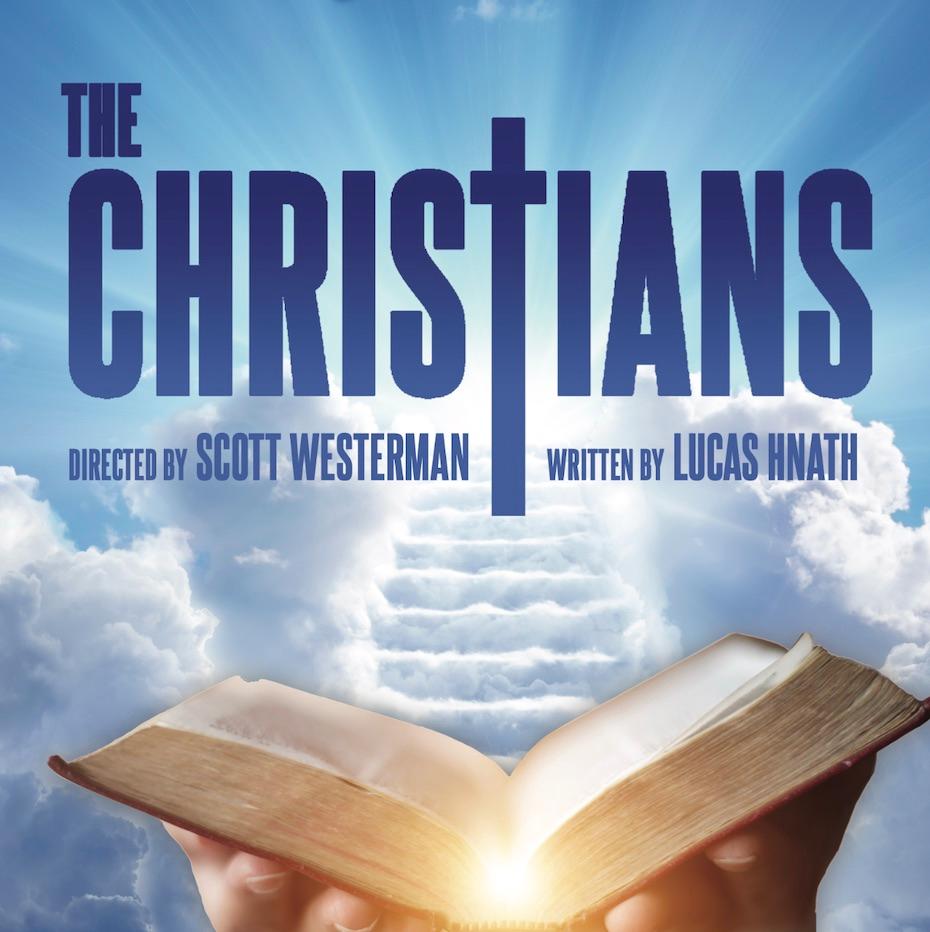
Edie Reese Review
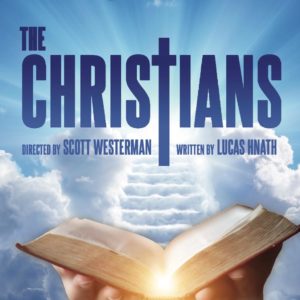 [rating=5] As you enter Citadel Theatre’s 144-seat auditorium, your eye is drawn to a life-sized “projection” of the Choir (Five members of Forte Chicago: Leah Hungerford, Margaret Izard Oskoui, Amanda Payne, Alex Salas and Angela Torres-Kutkuhn). They appear completely real, and it appears that they are looking directly at the audience, occasionally whispering to each other just as any choir members might do. Large side projections also convey real modernistic chapel walls and ceilings, giving the illusion of a mega-church seating thousands. The church “service” begins with the Choir’s blending their voices in perfect harmony. (The Choir is one of the few harmonious elements of the show.) The realistic nature of the “projections” (I don’t have adequate words to describe the exact nature of the technology involved) involves 80 large scale LED panels from Pangea Technology. This sophisticated technology is used in large-scale concerts, TV shows and movies. The flexibility of the technology allows not only for the creation of realistic settings, but also for a number of special effects throughout the show
[rating=5] As you enter Citadel Theatre’s 144-seat auditorium, your eye is drawn to a life-sized “projection” of the Choir (Five members of Forte Chicago: Leah Hungerford, Margaret Izard Oskoui, Amanda Payne, Alex Salas and Angela Torres-Kutkuhn). They appear completely real, and it appears that they are looking directly at the audience, occasionally whispering to each other just as any choir members might do. Large side projections also convey real modernistic chapel walls and ceilings, giving the illusion of a mega-church seating thousands. The church “service” begins with the Choir’s blending their voices in perfect harmony. (The Choir is one of the few harmonious elements of the show.) The realistic nature of the “projections” (I don’t have adequate words to describe the exact nature of the technology involved) involves 80 large scale LED panels from Pangea Technology. This sophisticated technology is used in large-scale concerts, TV shows and movies. The flexibility of the technology allows not only for the creation of realistic settings, but also for a number of special effects throughout the show
Even the best technology cannot make a good show without an engaging story and a superb cast. At first I was skeptical and even a bit skittish about seeing this show because I am Jewish and this show was about Christianity. I need not have worried. At the outset, the play (written by Lucas Hnath) takes no sides, and the author himself has never stated any position on the issue presented in the play. The show follows the journey of Pastor Paul (played to perfection by Founder and Artistic Director Scott Phelps), who, on the morning of delivering a sermon about the mega-church finally paying off its mortgage, reveals that he no longer believes in hell. This action causes ripples among other clergy members, the church board, congregants and even the pastor’s wife. Manny Sevilla, new to Citadel Theatre, is powerful as the Associate Pastor Joshua and Paul’s main challenger. Paul is also challenged by Jenny, a congregant, played by Abby Chafe. Dressed in a black tee with “Church Media” printed on the back, Jenny remains silent, operating a camera through most of the play. The audience hears her story and views only when she asks if she can give a “testimonial” a few weeks after Pastor Paul makes his announcement. (Jenny transforms from the confident camera operator to the shy, divorced mom congregant once she is at the pulpit. However, Jenny slowly gains courage and a voice as she poses increasingly difficult moral questions to Pastor Paul.)
New to Citadel Theatre, but a familiar face to Chicago and national audiences (local theater and movie, television and commercial work) Frank Nall plays Pastor Paul’s confidante Jay, a Church Elder. Jay represents the board of directors—the “business end” of the church (or any religious institution for that matter). The church in The Christians has, in addition to a huge chapel, dozens of religious school classrooms, a bookstore and a coffee shop. But it costs money to keep the lights on. When members start to leave the church, Jay complains about declining religious service attendance. This issue has plagued religions of all faiths over the last decade, as not only religious service attendance, but also religious affiliation itself has been steadily declining. Fewer congregants mean less money for facilities and programs.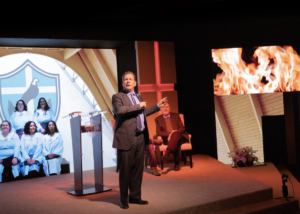
Co-Founder and Managing Director of Citadel Theatre Ellen Phelps plays Pastor Paul’s wife, Elizabeth. She’s also the real-life wife of Scott Phelps. That’s a lot of togetherness! Ellen jokes that her biggest challenge in this show is “working with my husband.” The pair create a perfectly believable impression of a married couple who don’t agree on an important issue. As Elizabeth, Ellen raises the question of whether or not a religious leader should tell their spouse about the content of their upcoming sermons. Does the importance of the disclosure rise the more involved the spouse is with the religious institution? (Here, Elizabeth runs a women’s prayer group.)
In his program notes, Director Scott Westerman insists that this play is not about religion at all. Although this play was written only eight years ago, technology has developed to the point that “(W)e are all performers now, constantly conscious of a potential audience, even when we’re alone. The conscience of an all-powerful god has been replaced by a million electric eyes in our laptops, cell phones, security cameras and satellites.” Westerman and Cinematographer Ian Merritt make sure that there are no walls between the video and onstage portions of the show. Scenic Designer Jonathan Berg-Einhorn and Master Carpenter Jason Clark are to be commended on scouting the locations and building out the stage to resemble a mega-church. Properties Designer Patrick McGuire deserves a shout-out for his Plexiglass pulpit design. I loved Costume Designer Mary Baca’s choir robes. As all of the actors wore body mics, Sound Board Operator Alex Trinh deserves special recognition as there was not one moment of feedback during the entire production. Rounding out the technical end of the show are Jessica Greenhoe, Stage Manager, Bobby Lee, Lighting Designer, Jonsey Jones, Sound Designer, Syler Thomas, Dramaturg, and Diana Dick, Scenic Change Artist. The entire technological concept of the show would not have been possible without Co-Production Managers Scott and Ellen Phelps.
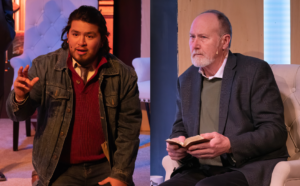 The show plays now through March 12 at Citadel Theatre, 300 South Waukegan Road, Lake Forest, IL 60045. Ticket prices for Wednesdays, Thursdays and Fridays are $40, Ticket prices for Saturdays and Sundays are $45. Tickets may be purchased online at www.citadeltheatre.org or by calling the box office at 847-735-8554 ext. 1. Discounts are available for groups, seniors and students by calling the box office. Performance times are as follows:
The show plays now through March 12 at Citadel Theatre, 300 South Waukegan Road, Lake Forest, IL 60045. Ticket prices for Wednesdays, Thursdays and Fridays are $40, Ticket prices for Saturdays and Sundays are $45. Tickets may be purchased online at www.citadeltheatre.org or by calling the box office at 847-735-8554 ext. 1. Discounts are available for groups, seniors and students by calling the box office. Performance times are as follows:
Thursdays, Fridays and Saturdays: 7:30 p.m.
Sundays: 3:p.m.
Wednesday, February 22: 1 pm
Wednesday, March 1: 7:30 p.m.
Wednesday, March 8: 1 p.m.
To see what others are saying, visit www.theatreinchicago.com, go to Review Round-Up and click at “The Christians”
FRANK MECCIA REVIEW
 [rating=4]How do you handle “Truth”, or a new idea that confronts your beliefs. “The Christians” , written by Lucas Hnath, lets you ponder this idea by bringing up a topic that most people believe in. How would handle your Pastor or Rabbi telling you one day, “There is no hell” ? Scott Phelps play’s Paul the Pastor of a Mega-Church ;a man who started out with a small store-front church with 10 congregants, and grew to a congregation in the thousands, and of course a church that he was able to build a huge conference center and pay off all debt.
[rating=4]How do you handle “Truth”, or a new idea that confronts your beliefs. “The Christians” , written by Lucas Hnath, lets you ponder this idea by bringing up a topic that most people believe in. How would handle your Pastor or Rabbi telling you one day, “There is no hell” ? Scott Phelps play’s Paul the Pastor of a Mega-Church ;a man who started out with a small store-front church with 10 congregants, and grew to a congregation in the thousands, and of course a church that he was able to build a huge conference center and pay off all debt.
One day , during his service, with his wife in attendance( played to perfection by Ellen Phelps), and a church Elder (played by Frank Nall) , he tells the story of a young boy who rushed into a burning building to save his sister, emerging from the flames shielding his sister he collapses and dies. Another Pastor who witnessed this said he was sad, that he could not save the boy. He was not talking about saving him from the flames, but because he wasn’t a Christian, he could not save him from going to hell where all non-believers go. This is where the Pastor confessed to his audience, that he does not believe in hell. And for the next 75 minutes we see the fall of a man who created a mega-church, with a great marriage, admired by the Elders of the church and his Associate Pastor Joshua played by Manny Sevilla, fall from grace and lose it all. I wonder during the service his statement that “Even Hitler is not in Hell”, is what caused him to lose everything. 
To be honest, according to a Pew Research study. 72% of U.S. adults believe in Heaven, 58% believe in hell. And that is not just Christians, 40% of the Jewish faith believe in hell, 89% of the Muslim faith, 47% of Buddhists’ and Hindu religion. The lowest number is among the Jehovah Witness at 7% and Atheist and Agnostic at 3%. Hell is mentioned in the transcribed Bible to English only a few times. The word “Hell” is based on the Hebrew word “Shaol” and the Greek word “Hades”, and the word means grave. To the Jehovah Witnesses, they believe when you die, you are buried and your body turns to ash, and nothing happens till the second coming and those who were righteous in their life go to heaven, the rest just remain as ash for all of eternity.
Scott Westerman’s direction is flawless and makes great use of the intimate space that this theater company has learned to use to its best advantage.
Ellen and Scott Phelps as production managers and as principal characters show the dramatics behind this question. I felt the pain the Pastor was going through that made him bring up this topic. Manny Sevilla as Joshua who creates this schism in the church and the loss of members did a great job. But the real interesting aspect of the show goes to Jonathan Berg-Einhorn and Diana Dick who were the Scenic Designer and Scenic Charge Artist. The Citadel being a small theater turned the entire auditorium into a mega-church, with the clever use of green screens and projections, you felt that you were in a huge mega church, and then in their home and church library, special thanks to Jason Clark the master carpenter who helped create this set. 
The Christians being a play first published just 8 years ago, shows the many aspects of modern society and technology. It also questions your ideas and beliefs.
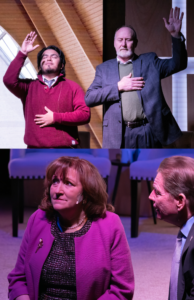 “The Christians” is playing till March 12.
“The Christians” is playing till March 12.
Performances are as follows:
Thursdays 7:30 p.m.
Fridays 7:30 p.m.
Saturdays 7:30 p.m.
Sundays 3 p.m.
The Wednesday matinees are 2/22 and 3/5 at 1 p.m.
Order tickets online at www.citadeltheatre.org or call (847) 735-8554 ext.1.
The theatre is located at 300 S. Waukegan Road Lake Forest, Il with plenty of free parking. Lake Forest is less than a 40 min drive from Chicago, and so worth it with its great shops and eating establishments nearby. I give this play a high recommendation.
To see what others are saying, visit www.theatreinchicago.com, go to Review Round-Up and click at “”The Christians”






More Stories
“The Firebugs” reviewed by Julia W. Rath
“The Book of Grace” Al Bresloff with another from Paul LIsnek
“The Last Five Years” MILWAUKEE